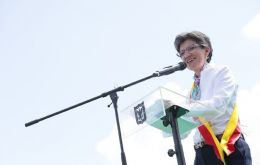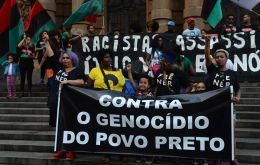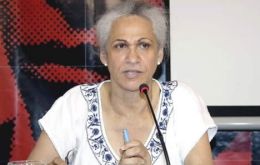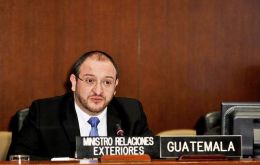MercoPress. South Atlantic News Agency
Tag: racism
-
Tuesday, April 7th 2020 - 07:53 UTC
Beijing furious with Brazil after Education minister links COVID-19 pandemic to China's “plan for world domination”

China demanded an explanation from Brazil on Monday after the conservative government’s education minister linked the COVID-19 coronavirus pandemic to the Asian country’s “plan for world domination,” in a tweet imitating a Chinese accent.
-
Thursday, January 2nd 2020 - 08:35 UTC
Colombia's capital first woman mayor promises to fight “racism, class distinctions and xenophobia”

Bogota's first woman mayor Claudia Lopez took office on Wednesday, promising leadership in the troubled Colombian capital and pledging to fight “racism, class distinctions and xenophobia.”
-
Tuesday, December 24th 2019 - 09:14 UTC
UK government calls on football chiefs to rid the sport of racism; UEFA chief accuses Johnson of fuelling the situation

The British government called on football chiefs on Monday to do more to rid the sport of racism but stopped short of launching a full-scale inquiry demanded by the domestic players' union following the latest incident in the English game.
-
Thursday, May 9th 2019 - 09:55 UTC
Bolsonaro denies he's a racist and that racism is a problem in Brazil

Racism is an insignificant problem in Brazil, according to President Jair Bolsonaro, who has been accused of not just racist but also homophobic and sexist comments in the past. Bolsonaro spoke to Rede TV in an interview broadcast on Tuesday night, in which he defended his record on a number of controversial subjects.
-
Friday, January 11th 2019 - 12:27 UTC
Bolsonaro's “traditional values” reaches Brazilian school textbooks

School textbooks in Brazil will no longer need to highlight the country's ethnic diversity under rule changes brought in under the government of new far-right President Jair Bolsonaro.
-
Monday, September 24th 2018 - 09:17 UTC
Brazil's colored community sponsors Black & Black network to promote its political candidates

In Brazil's general elections approach, a new social network is gaining traction aimed at giving greater visibility to black candidates while highlighting anti-racism initiatives in the country tainted by racial prejudice. Black & Black, which has 100,000 users -- in a population of more than 200 million -- aims to “connect the demands and narratives of the world's black population” and to ensure that “black people get the prominence they deserve.”
-
Tuesday, April 29th 2014 - 06:15 UTC
Overwhelming support for Dani Alves from FIFA, fellow players and Dilma

FIFA president Joseph Blatter and several top players came out in support Monday of Barcelona right-back Dani Alves, who ate half of a banana that was thrown at him in a racist gesture a day earlier during his side's 3-2 win at Villarreal.
-
Monday, December 16th 2013 - 16:52 UTC
UN research panel says 'institutionalized racism' persists in Brazil

Institutionalized racism persists in Brazil despite government efforts to tackle the issue, according to members of a United Nations panel examining conditions among black Brazilians in five cities. However Brazilian blacks ``still suffer from structural, institutional and interpersonal racism.''
-
Thursday, June 6th 2013 - 06:38 UTC
OAS assembly adopts convention against racism and all forms of intolerance

The General Assembly of the Organization of American States (OAS), meeting in Guatemala adopted the Inter-American Convention against Racism, Racial Discrimination, and Related Forms of Intolerance and the Inter-American Convention against All Forms of Discrimination and Intolerance and opened them for signature.
-
Tuesday, October 16th 2012 - 07:37 UTC
Brazil implements racial and income affirmative action at federal universities

The law which forces Brazilian federal universities to leave 50% of higher education seats to students from government schools and minorities such as blacks and indigenous became effective on Monday.
